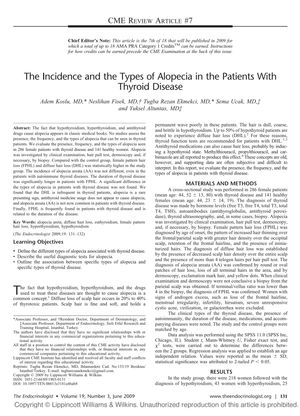The Incidence and Types of Alopecia in Patients With Thyroid Disease
May 2009
in “
Endocrinologist
”

TLDR Women with thyroid disease are more likely to experience female pattern hair loss, especially if they've had thyroid disease for a long time.
In 2009, a study involving 286 female patients with thyroid disease and 141 healthy women found that female pattern hair loss (FPHL) and diffuse hair loss (DHL) occurred more frequently in those with thyroid conditions. The study did not find a significant difference in the incidence of alopecia areata (AA) between the two groups, nor did it find a difference in alopecia types among different thyroid diseases. It was noted that the duration of thyroid disease was longer in patients with FPHL, indicating a possible link between the disease duration and FPHL. The study concluded that while DHL is rare and alopecia is an uncommon initial symptom in thyroid patients, antithyroid medications do not seem to cause hair loss, AA is uncommon in thyroid patients, and FPHL is often associated with thyroid disease and its duration.





